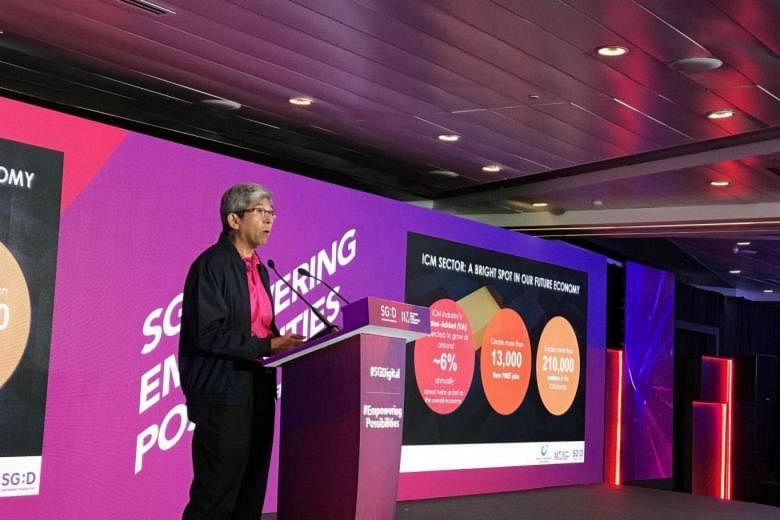Singapore's embrace of the infocomm media (ICM) industry will not only create thousands of jobs, but also open new frontiers for the businesses that take advantage of trends like artificial intelligence.
Unveiling the ICM Industry Transformation Map yesterday, Minister for Communications and Information Yaacob Ibrahim let some numbers speak for themselves: By 2020, the sector that already employs 194,000 people will create another 16,000 jobs. Of these, 13,000 are expected to be professional, managerial, executive and technician (PMET) roles.
ICM's value-add is expected to grow at 6 per cent a year - twice as fast as the overall economy.
"This presents immense opportunities for both companies and workers in the ICM sector, and stands in stark contrast to the larger backdrop of the global slowdown," said Dr Yaacob at the Infocomm Media Development Authority's (IMDA) first anniversary celebrations yesterday.
But more importantly, as far as the Singapore economy was concerned, the benefits of strengthening ICM went well beyond the sector itself, said Dr Yaacob.
It would allow companies and businesses to improve operations, serve their customers better and find new sources of growth - while also improving the customer experience. "The transformation of this sector will serve as a growth multiplier for other sectors of the economy," he said.
The blueprint to transform the sector will focus on several key areas and Dr Yaacob gave a glimpse into how one of them - artificial intelligence - was already helping companies make strides.
For retailers that offered tens of thousands of products online, AI could recommend those that a customer was likely to be more interested in - based on browsing or purchasing patterns - and suggest alternatives when a product was out of stock. This meant happier customers and higher revenues.
IMDA was ready to invest in manpower training for AI, said Dr Yaacob. It will launch an AI apprenticeship programme to provide on-the-job or course training for the first batch of 200 AI professionals over the next three years.
The programme is a first for AI under the IMDA's tech skills development and job placement initiative, TechSkills Accelerator (Tesa), which has already trained 16,000 professionals in new tech skills to prepare them for the digital economy since April last year.
There will be more funding for AI apart from the $150 million already announced by the National Research Foundation in May this year.
Meanwhile, two new AI companies - DataRobot and Taiger - have been added to a pool of six AI companies under a scheme to help start-ups expand overseas and give them a foot in the door when they apply for Singapore Government tenders.
To help speed up the development of speech-enabled applications for local use, there are also plans to create an AI library of Singaporean accents in English.
This will help start-ups develop voice apps that understand or correctly pronounce terms such as "nasi lemak", "Ang Mo Kio" or "Tampines".
This could help local firms grab a slice of the global speech recognition market, tipped to be worth $25 billion by 2023.
SEE TOP OF THE NEWS


